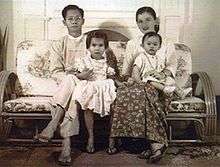Sao Kya Seng
| Sao Kya Seng စဝ်ကြာဆိုင် | |
|---|---|
 Sao Kya Seng and his family | |
| Born |
1924 Hsipaw, Federated Shan States, British Burma |
| Disappeared |
March 1962 (aged 37–38) Shan State, Burma (Myanmar) |
| Spouse(s) | Inge Eberhard |
| Children |
2 |
| Saopha of Hsipaw State | |
|
In office 1947–1959 | |
| Prime Minister |
U Nu Ba Swe Ne Win |
| Preceded by | Sao Ohn Kya |
| Succeeded by | position abolished |
| Member of Chamber of Nationalities | |
|
In office 1954–1962 | |
| Prime Minister |
U Nu Ba Swe Ne Win |
| Preceded by | position established |
| Succeeded by | position abolished |
| Constituency | Hsipaw |
| Personal details | |
| Political party | AFPFL |
| Alma mater | Colorado School of Mines |
| Profession |
mining engineer agriculturalist politician |
| Religion | Theravada Buddhism |
Sao Kya Seng or Sao Kya Hseng (Burmese: စဝ်ကြာဆိုင်; 1924 – disappeared in 1962) was a politician, a mining engineer, an agriculturalist and the last saopha of Hsipaw State, Myanmar from 1947 to 1959. He studied mining engineering at the Colorado School of Mines in Golden, Colorado, United States, from 1949 to 1953.[1] He was graduated with a BSc degree in 1953 and then married. His bride, Sao Nang Thu Sandi or Inge Eberhard, a German-speaking Austrian student who had received a Fulbright Scholarship in 1951, was studying at Colorado Women's College, a constituent college of Denver University. In 1954, he returned to Burma with her and they had two daughters, Mayari and Kennari.[1]
After arrival, they were crowned as saopha and mahadevi although Sao Kya Seng had received this title since 1947. He abdicated in 1959. He served as a member of the Chamber of Nationalities from 1954 to 1962 which was upper house of Burma from 1948 to 1962, member for Shan State Council and secretary for the Association of Shan Princes from 1954 to 1962, representing Hsipaw constituency, Shan State. He was arrested in 1962 after General Ne Win's 1962 Burmese coup d'état. Sao Kya Seng was last seen being taken into custody at an army checkpoint near Taunggyi.[1][2]
Sao Kya Seng was considered by the Shan people as one of the Shan national leaders who promoted federalism and democracy, together with Sao Shwe Thaik and Sao Hkun Hkio. His nephew, Khun Htun Oo, son of his elder brother Sao Kyar Zon, served as president of Shan National League for Democracy, a major political party representing Shan people.
In popular culture
Sao Kya Seng's wife, Inge, wrote a book, Twilight Over Burma: My Life as a Shan Princess, in 1994 about her marriage and life in Burma.[3] The book became the film, Twilight Over Burma, in 2015.[4] The film was banned in both Myanmar and Thailand.[5]
References
- 1 2 3 Huanok, Withaya (2015-10-08). "Posthumous Award Revives Memories of a Shan Prince". The Irrawaddy. Irrawaddy Publishing Group. Retrieved 2016-03-27.
- ↑ Graber, Janna L. (2001-02-14). "A Royal Duty—Inge Sargent, A Former Princess Of Burma, Works To Help Those Still Caught In Country's Turmoil". Chicago Tribune. Retrieved 2016-03-27.
- ↑ Sargent, Inge (1994). Twilight Over Burma: My Life as a Shan Princess (Paper ed.). Honolulu: University of Hawaii Press. ISBN 0824816285. Retrieved 8 July 2016.
- ↑ "Twilight Over Burma". iMDB. 2015. Retrieved 8 July 2016.
- ↑ "Thailand joins Myanmar in banning movie". The Nation. Retrieved 8 July 2016.